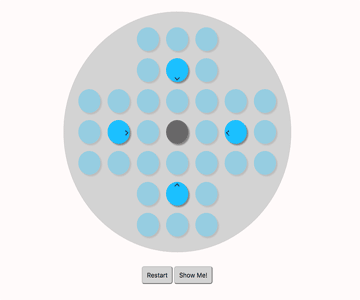Overview of Peg Solitaire
by John Vincent
Posted on March 9, 2017
Peg Solitaire
Peg Solitaire is a game that consists of a board with 33 holes arranged in the pattern given in the picture above. At the start, every hole except the center is filled with a peg. The player then starts jumping pegs. Any peg that is jumped over is removed, just as in checkers. Vertical and horizontal jumps are allowed, but diagonal jumps are forbidden. The goal is to reach a position where only one peg remains, and that peg is in the center hole.
Live Deployment
Technical
- Peg Solitaire is a responsive web application.
- Peg Solitaire is built using HTML5, JavaScript, jQuery, Sass, and CSS3.
- Peg Solitaire solutions are provided by a Spring Boot Microservice.
Client
- HTML5
- Html5 DnD
- JavaScript
- jQuery
- CSS3
- Sass
- Fully responsive
Server
Production Deployment
Deployment Overview
Deployed to Digital Ocean along with the main website. See Overview of johnvincent.io website
The following details the changes that were made to that environment.
Install and Configure Java
Update the system
sudo apt-get update && apt-get upgrade
install the default JDK
sudo apt-get install default-jdk
Check java version
java -version
Nginx Server Configuration
/etc/nginx/sites-available/https/peg-solitaire
server {
listen 80;
listen [::]:80;
server_name peg-solitaire.johnvincent.io www.peg-solitaire.johnvincent.io;
return 301 https://www.peg-solitaire.johnvincent.io$request_uri;
}
server {
listen 443 ssl http2;
listen [::]:443 ssl http2;
include snippets/ssl-peg-solitaire-johnvincent.io.conf;
include snippets/ssl-params.conf;
server_name peg-solitaire.johnvincent.io;
return 301 https://www.peg-solitaire.johnvincent.io$request_uri;
}
server {
listen 443 ssl http2;
listen [::]:443 ssl http2;
include snippets/ssl-peg-solitaire-johnvincent.io.conf;
include snippets/ssl-params.conf;
include h5bp/basic.conf;
root /var/www/peg-solitaire/html;
index index.html;
server_name www.peg-solitaire.johnvincent.io;
location / {
try_files $uri $uri/ =404;
}
location /api {
proxy_pass http://localhost:9417/solution;
}
location ~ /.well-known {
allow all;
}
}
Notice the proxy to the Spring Boot Microservice
location /api {
proxy_pass http://localhost:9417/solution;
}
Deployment script
'deploy-peg-solitaire-app'
#!/bin/sh
#
# script to get, build and deploy apps to nginx
#
# setup ssh to github
#
echo "setup ssh to github"
eval "$(ssh-agent)"
ssh-add -k ~/.ssh/id_github
#
cd
cd tmp
#
CLONES_DIR="/home/jv/clones"
DOCROOT_DIR="/var/www/peg-solitaire/html"
SERVER_ROOT_DIR="/var/www/peg-solitaire/server"
#
echo "Removing clones directory $CLONES_DIR"
rm -rf $CLONES_DIR
#
echo "Creating clones directory $CLONES_DIR"
mkdir $CLONES_DIR
cd $CLONES_DIR
#
echo "Git clone desired repositories to $CLONES_DIR"
git clone git@github.com:johnvincentio/peg-solitaire $CLONES_DIR/peg-solitaire
git clone git@github.com:johnvincentio/peg-solitaire-server $CLONES_DIR/peg-solitaire-server
#
# Delete files in nginx docroot
#
echo "Delete files in Nginx Docroot"
rm -rf $DOCROOT_DIR/*
#
# Copy files to nginx docroot
#
echo "Copy files to Nginx Docroot"
cp -r /home/jv/clones/peg-solitaire/* $DOCROOT_DIR
#
# set permissions
#
echo "Setting permissions on $DOCROOT_DIR"
sudo chown -R jv:jv $DOCROOT_DIR
sudo chmod 0755 $DOCROOT_DIR
find $DOCROOT_DIR -type d -print0 | xargs -0 chmod 0755 # For directories
find $DOCROOT_DIR -type f -print0 | xargs -0 chmod 0644 # For files
#
# Delete files in nginx server-root
#
echo "Delete files in server root $SERVER_ROOT_DIR"
rm -rf $SERVER_ROOT_DIR/*
#
# Copy files to server root
#
echo "Copy files to server root"
cp /home/jv/clones/peg-solitaire-server/solitaire.jar $SERVER_ROOT_DIR
cp /home/jv/clones/peg-solitaire-server/solitaire/solitaire.json $SERVER_ROOT_DIR
echo "Setting permissions on $SERVER_ROOT_DIR"
sudo chown -R jv:jv $SERVER_ROOT_DIR
sudo chmod 0755 $SERVER_ROOT_DIR
find $SERVER_ROOT_DIR -type d -print0 | xargs -0 chmod 0755 # For directories
find $SERVER_ROOT_DIR -type f -print0 | xargs -0 chmod 0644 # For files
echo "Handle PM2"
cd $SERVER_ROOT_DIR
handle-pm2
echo "Restarting Nginx"
nginx-restart
#
echo "Completed"
Spring Microservice
Notice the copy to /var/www/peg-solitaire/server of
solitaire.jarsolitaire.json
Keep Spring Boot Microservice running
The deployment uses PM2 to keep the Microservice running.
Create /var/www/peg-solitaire/solitaire.json
{
"apps":[
{
"name":"peg-solitaire-server",
"cwd":".",
"script":"/usr/bin/java",
"args":[
"-jar",
"/var/www/peg-solitaire/server/solitaire.jar"
],
"watch":[
"/var/www/peg-solitaire/server/solitaire.jar"
],
"node_args":[],
"log_date_format":"YYYY-MM-DD HH:mm Z",
"exec_interpreter":"",
"exec_mode":"fork"
}
]
}
PM2 Control Script
Modify handle-pm2
#!/bin/bash
#
# script to add tasks to pm2 if not already added, or to restart
# the tasks if they have already been added.
#
echo "Current PM2 status"
pm2 list
#
echo "Check status of music server"
pm2 describe server > /dev/null
RUNNING=$?
if [ "${RUNNING}" -ne 0 ]; then
echo "Adding music server to PM2"
cd /var/www/music/server
pm2 start server.js
else
echo "Restarting music server"
pm2 restart server
fi;
echo "Check status of peg-solitaire server"
pm2 describe peg-solitaire-server > /dev/null
RUNNING=$?
if [ "${RUNNING}" -ne 0 ]; then
echo "Adding peg-solitaire-server to PM2"
cd /var/www/peg-solitaire/server
pm2 start solitaire.json
else
echo "Restarting peg-solitaire-server"
pm2 restart peg-solitaire-server
fi;
#
echo "Show current pm2 status"
pm2 list
echo "Restarting PM2"
pm2 restart all
Production Testing
To test the Spring Boot Microservice from a server
wget http://localhost:9417/solution
To test the Spring Boot Microservice from a browser
https://www.peg-solitaire.johnvincent.io/api
Production Status
To show the state of all services
pm2 list
To show the state of the microservice
pm2 show peg-solitaire-server
Notice the logs may be found at
/home/jv/.pm2/logs
To monitor the microservice
pm2 monit peg-solitaire-server
Development
Peg Solitaire Client is a browser based client.
Peg Solitaire Server is a Spring Boot Microservice that provides solutions.
Peg Solitaire Solutions is a node application that calculates all possible solutions.
Build Spring Boot Microservice
Dependency: Spring Web
Start eclipse-jee from /Users/jv/Desktop/MyDevelopment/github/projects/peg-solitaire-server
Import Project from /Users/jv/Desktop/MyDevelopment/github/projects/peg-solitaire-server
Server Port
Edit application.properties and add server.port=9417
Execute the service
cd /Users/jv/Desktop/MyDevelopment/github/projects/peg-solitaire-server/solitaire
./mvnw spring-boot:run
Test the service
http://localhost:9417/solution
or
http://localhost:9417/solution?id=637
Build Microservice as an executable Jar
Create /Users/jv/Desktop/MyDevelopment/github/projects/peg-solitaire-server/solitaire/create-package
#!/bin/sh
#
# script to create Jar
#
#
echo "Maven clean and make the package"
./mvnw clean package
echo "Save Jar"
cp target/solitaire-0.0.1-SNAPSHOT.jar ../solitaire.jar
echo "Completed"
Run the script create-package
and
java -jar solitaire.jar
Test using
http://localhost:9417/solution?id=10000
or
wget http://localhost:9417/solution?id=10000
Test the client
Create /Users/jv/Desktop/MyDevelopment/github/website/peg-solitaire/run-http-server
#!/bin/sh
#
# script to run http server
#
PORT="9501"
echo "Run HTTP server on port $PORT"
#
run-http-server $PORT .
Start HTTP Server
cd /Users/jv/Desktop/MyDevelopment/github/website/peg-solitaire
./run-http-server
and test
http://127.0.0.1:9501
Other
The proxy of the /api to a microservice http://localhost:9517/solution will cause CORS problems.
Spring Boot has a built-in solution.
@CrossOrigin(origins = "*", allowedHeaders = "*")
@GetMapping("/solution")
public List<Solution> findSolution(@RequestParam(value = "id", defaultValue = "0") int id) {
StringBuffer sb = getFileContents(id);
List<Solution> list = Utils.JSONArraytoListObject(sb.toString());
return list;
}
This implementation allows all. To be more restrictive, use something like
@CrossOrigin(origins = "http://localhost:9501")
